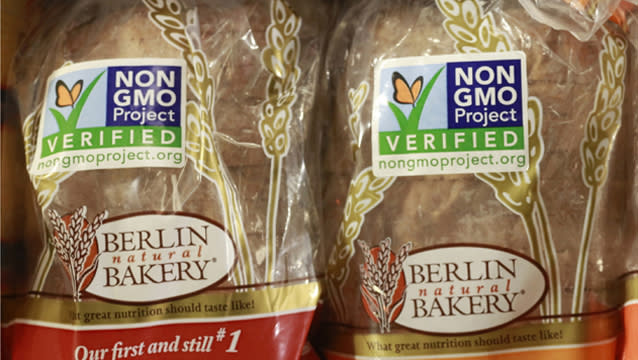Michael Pollan: Genetically Modified Foods Offer Consumers “Nothing”

Few Americans were aware of the dangers of industrial farming and processed food before Michael Pollan published his best-selling books “In Defense of Food” and the “Omnivore’s Dilemma.”
A hero to the locavore and organic movements, Pollan has never shied away from expressing his opinions on what to eat, where to eat and the proper way to raise and harvest what we eat.
In his new book “Cooked," Pollan urges more Americans to home-cook their meals. Cooking, he says, will lower obesity rates and re-connect individuals with “the material world.”
Related: Michael Pollan: Home Cooking Will Solve America's Obesity Epidemic
Eating the right foods are as important as eating foods that are not genetically modified, Pollan argues in the accompanying clip. Genetically modified organisms (GMOs) are “plants or animals created through the gene splicing techniques of biotechnology, or genetic engineering,” according to The Non-GMO Project, a nonprofit organization that tests food products for GMOs.
"This experimental technology merges DNA from different species, creating unstable combinations of plant, animal, bacterial and viral genes that cannot occur in nature or in traditional crossbreeding," it says.
Soybeans, corn, cotton, canola, zucchini, summer squash and sugar beets are high-risk of being GMO. Dairy and animal products also expose consumers to GMO crops because animals are fed a diet rich in corn and grains. About 70% to 80% of processed foods sold in the U.S. are made with genetically engineered ingredients.
Sixty-four countries around the world, including Japan, South Korea, China, Australia, New Zealand, Thailand, Russia and European Union member states, have significant restrictions or outright bans on the production and sale of GMOs.
Last November California voters rejected a ballot initiative that would have required all food to be labeled as GMO or non-GMO. Opponents of the measure, including Monsanto (MON), Dupont (DD), Dow Chemical (DOW) and PepsiCo (PEP), raised more than $45 million to defeat the proposed labeling law.
Supporters of labeling say that GMO foods damage the environment and present serious health risks like organ failure. Genetically modified seeds have also become resistant to pests and invasive weeds. Last week Sen. Barbara Boxer (D-CA) and Rep. Peter DeFazio (D-OR) introduced a bill that would require the labeling of GMO ingredients.
The Genetically Engineered Food Right-to-Know Act would force food manufacturers to label fruits, vegetables, processed foods and seafood as genetically altered. The Food and Drug Administration has allowed genetically altered foods to be sold without labeling since 1992 and does not require safety studies of such foods.
Washington state has introduced a ballot initiative titled I-522 that seeks labeling and transparency of these foods. Whole Foods (WFM) announced in April that it would label all products containing GMOs in its U.S. and Canadian stores by 2018.
Related: Organic Foods Are Worth the Cost: Whole Foods CEO
Pollan says there has been a lot of support in Washington by local farmers and residents to pass the state's GMO bill. Telling people where their food comes from should be a “fundamental right,” he argues.
“Many people are absolutely fine with genetically modified food,” he says. “This is not an argument that it’s dangerous. But the way food is produced is relevant to the consumer. There are people who care. Personal responsibility should rule. But personal responsibility depends on information.”
Consumers across the country are becoming more aware of the GMO labeling issue. The fastest-growing category in the super market today is products labeled GMO-free, Pollan notes. The organic food industry grew at 7.7% in 2010 and the organic industry is creating jobs at four times the national rate, according to the I-522 Web site.
Agribusiness giant Monsanto has been one of the most vocal opponents of GMO labeling. The company generates revenue from seed sales and the licensing of its genetic seed technology to other corporations. Monsanto has been spending millions of dollars fighting these labeling proposals because they could dramatically impact the company’s earnings and stock price.
“So far genetically modified products offer consumers nothing,” Pollan says. “That’s why [Monsanto] has to be so quiet about it. They love to talk to farmers and they love to talk to Wall Street but they don’t like to talk to consumers because they don’t have a story tell – yet. When they come up with products that are nutritionally enhanced, or save on calories, it’s another conversation.”
Pollan also discusses why he supports soda tax laws to curb obesity in the above video.
Tell Us What You Think!
Got a topic you’d like covered? Have a guest you’d like to see interviewed? Send an email to: thedailyticker@yahoo.com.
You can also look us up on Twitter and Facebook.
More from the Daily Ticker
